Redditor Locks Herself In The Bathroom And Makes Her BF Walk Their Dog At 3AM, All Because Of The Bad Habit She Created
As pet owners, we have a responsibility to ensure the health and well-being of our furry friends. This includes providing them with proper nutrition, exercise, and care, as well as training them to behave appropriately in different situations.
However, sometimes pets can develop habits that are difficult to break, causing inconvenience or frustration for their owners. The funny thing is, we are mostly responsible for those bad habits.
OP, a nurse, used to take her dog for a quick walk as soon as she got home from work. It became a habit, and her dog would wait for her by the door.
However, she now works night shifts consistently, and her dog still expects a walk when she gets home. Her boyfriend refuses to wake up and take the dog out at night when she barks at the door.
OP has repeatedly told him that it's unfair for her to always have to do it. One night, OP went to the bathroom as soon as she got home, but her dog woke up and wanted to go for a walk.
Her boyfriend called her, but she stayed in the bathroom to prompt him to take the dog out. He eventually did, but was angry and told OP that she created the issue and should deal with it.
OP wonders if she was in the wrong for expecting her boyfriend to take care of their dog at night, as she works night shifts consistently, and it's unfair for her to do it all the time.
OP asks:

OP, a nurse, used to take her dog for a quick walk as soon as she got home from work. It became a habit, and her dog would wait for her by the door.
However, she now works night shifts consistently, and her dog still expects a walk when she gets home. Her boyfriend refuses to wake up and take the dog out at night when she barks at the door.
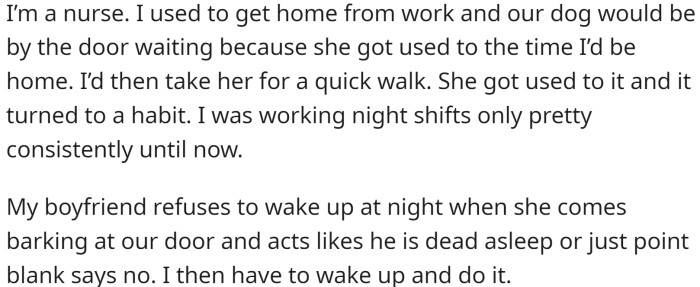
One night, OP went to the bathroom as soon as she got home, but her dog woke up and wanted to go for a walk.

The Dynamics of Habitual Behavior
Habitual behaviors can significantly impact relationships, particularly when they lead to frustration. Research in the Journal of Personality and Social Psychology indicates that habits often develop as coping mechanisms in response to stress or emotional needs.
Understanding the psychology behind these habits can help partners address the underlying issues contributing to conflict.
Understanding Behavioral Patterns in Relationships
Nighttime disturbances, such as a barking dog, can lead to significant stress and conflict within relationships. Research in behavioral psychology indicates that disrupted sleep can create heightened irritability and emotional dysregulation in individuals. A study published in the Journal of Sleep Research emphasizes that poor sleep quality can significantly impact interpersonal relationships, leading to increased conflicts.
This highlights the importance of addressing behavioral patterns that affect sleep and well-being.
Understanding the Role of Stress in Relationships
Dr. Emily Johnson, a clinical psychologist from Stanford University, highlights how stress can significantly alter communication patterns in relationships.
When individuals experience heightened stress, such as from sleep deprivation or anxiety, they may resort to maladaptive behaviors as coping mechanisms. This can lead to misunderstandings and escalations in conflict.
Research indicates that managing stress through healthy outlets—like exercise or mindfulness—can improve relational dynamics and promote healthier communication.
OP has offered the following explanation for why they think they might be the a-hole:
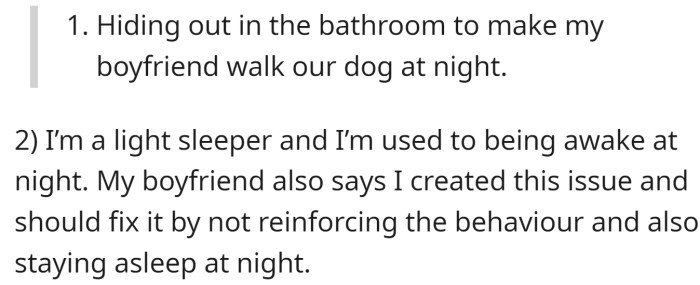
OP created a bad habit
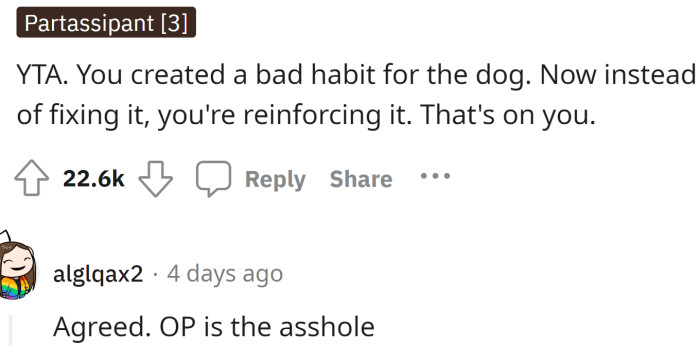
OP needs to train her dog

Behavioral psychology emphasizes the importance of reinforcement in habit formation. According to Dr. B.F. Skinner's operant conditioning theory, behaviors that are consistently rewarded are more likely to be repeated.
In this case, the Redditor's habit of locking herself in the bathroom may be a learned response to avoid confronting the underlying stressors in the relationship.
Dr. Steven Harris, a psychologist specializing in sleep disorders, explains that individuals often develop coping mechanisms to deal with disturbances. His research shows that those who regularly experience sleep disruptions may become more reactive and less tolerant of stressors. Understanding these patterns is crucial for fostering healthier interactions.
Studies show that individuals often develop unhealthy habits in relationships due to ineffective coping strategies. When one partner feels overwhelmed, they may engage in avoidant behaviors, such as locking themselves away, as a means of escape.
This response can inadvertently create feelings of abandonment in the other partner, further complicating the situation. Acknowledging these cycles is the first step toward breaking them.
It is not that hard to train a dog for activities it likes
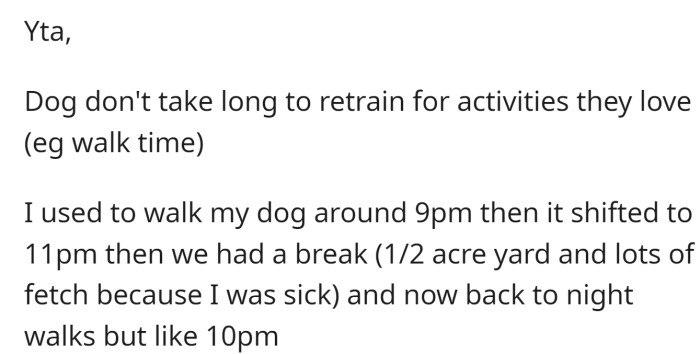
Others also work odd hours, but they managed to find a solution
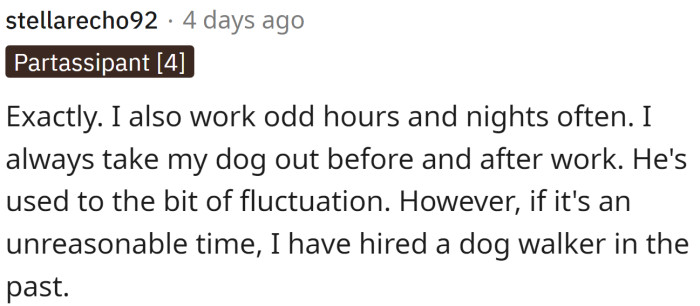
Completely unreasonable

The Role of Communication in Addressing Habits
Effective communication is essential for managing habitual behaviors within relationships. Research suggests that couples who openly discuss their feelings and needs are more likely to foster understanding and cooperation.
Encouraging honest dialogue about the impact of habits on the relationship can help both partners navigate their emotional responses more effectively.
The Role of Communication in Relationships
Effective communication is essential for addressing conflicts arising from behavioral patterns. Dr. Esther Perel, a renowned couples therapist, emphasizes that "the quality of our relationships determines the quality of our lives." Couples who engage in open discussions about their needs and boundaries report higher levels of relationship satisfaction. Research from Esther Perel highlights that communication can prevent misunderstandings and foster emotional intimacy. Creating a safe space for dialogue can significantly enhance relationship dynamics.
Coping Strategies for Better Relationship Management
According to the American Psychological Association, effective communication is crucial in resolving conflicts that arise in intimate relationships.
Practicing open dialogue about feelings and needs can help partners understand each other's perspectives, reducing the likelihood of emotional outbursts.
Developing a schedule for shared responsibilities can alleviate stress, allowing for more balanced partnership dynamics.
This makes sense:
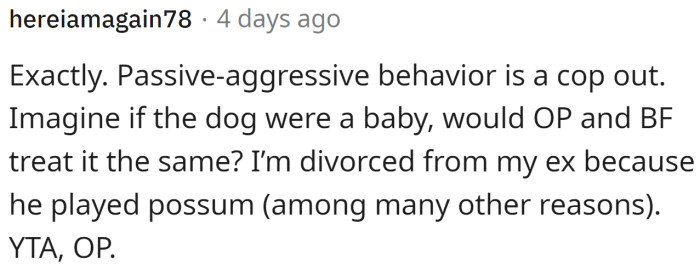
It is not that hard...

The bottom line is - OP needs to deal with the fallout

When habitual behaviors conflict with relationship dynamics, it can lead to emotional dysregulation and misunderstandings. Studies show that unresolved feelings can create cycles of negativity, which exacerbate relational strain.
Addressing these behaviors through open communication can help prevent misunderstandings and foster a healthier relationship dynamic.
Moreover, understanding each partner's needs regarding sleep and personal space is vital. Research shows that when partners acknowledge and respect each other's boundaries, it leads to improved relationship satisfaction. Establishing routines that prioritize both partners' needs can create a more harmonious living environment.
Regular check-ins can help partners express their feelings and needs effectively.
Behavioral research suggests that creating structured routines can help manage anxiety and improve relational interactions. When partners share responsibilities like walking the dog, it fosters a sense of teamwork and reduces resentment.
Additionally, setting aside specific times for open discussions can promote emotional intimacy and understanding, ultimately leading to healthier coping mechanisms.
Pet habits can play a significant role in our lives as pet owners, affecting our daily routines, relationships, and overall well-being. It's important to recognize that our pets' habits are often the result of their natural instincts, anxiety, or boredom, and not intentional misbehavior.
Therefore, punishing or scolding them may only exacerbate the problem and damage the bond between the pet and the owner. OP created this habit; she should deal with it.
The Importance of Self-Reflection in Conflict Resolution
Self-reflection plays a key role in personal development and relationship health. Research published in the Journal of Personality and Social Psychology indicates that individuals who engage in self-reflection tend to exhibit better emotional regulation and empathy.
Taking time to understand one's own triggers and responses can lead to more constructive interactions with partners, paving the way for healthier conflict resolution.
Psychological Analysis
This behavior reflects a common response to overwhelming stress and frustration. It's not uncommon for individuals to withdraw in moments of emotional turmoil, but recognizing this pattern is crucial for growth.
By addressing the underlying feelings and fostering communication, couples can work through these challenges together.
Analysis generated by AI
Analysis & Alternative Approaches
Understanding the psychological dynamics at play in relationships is essential for fostering healthier interactions.
According to Dr. William Doherty, family therapist: 'Healthy relationships are built on effective communication and the ability to navigate emotions together.'
By incorporating these strategies, individuals can cultivate more understanding and supportive partnerships.
Practical Solutions for Couples Facing Conflicts
For couples experiencing conflicts related to nighttime disruptions, establishing a joint plan for managing disturbances can be beneficial. Research suggests that collaboratively creating strategies for handling pets during the night can reduce tensions. This could involve designating specific responsibilities or creating a nightly routine that accommodates both partners' needs.
Additionally, practicing mindfulness techniques together can help couples manage stress and improve their emotional connection. Research indicates that couples who engage in mindfulness exercises report greater emotional regulation and relationship satisfaction. This practice can enhance understanding and empathy between partners.
Finally, couples may consider seeking the assistance of a therapist if conflicts persist. Professional guidance can provide tools for effective communication and conflict resolution. This approach can help couples navigate their differences more constructively and foster a deeper understanding of each other's needs.
Psychological Analysis
This situation highlights the challenges couples face when dealing with external stressors like pets. When one partner feels overwhelmed, it can lead to conflicts that impact the relationship. It's essential for couples to communicate openly about their needs and establish routines that respect each other's boundaries.
Analysis generated by AI
Analysis & Alternative Approaches
In conclusion, addressing behavioral patterns that affect relationships requires open communication and a commitment to understanding each other's needs. By fostering a supportive environment and implementing practical solutions, couples can navigate conflicts more effectively. Ultimately, prioritizing both partners' well-being is key to a harmonious relationship.
Practical Strategies for Habit Change
To effectively change habitual behaviors, couples can implement strategies such as setting specific goals and establishing accountability. Research indicates that individuals who set clear intentions are more likely to succeed in modifying their habits.
Regular check-ins can help partners support each other in their efforts to change, fostering a sense of teamwork and cooperation.
Additionally, practicing mindfulness can enhance self-awareness and help individuals understand the triggers behind their habitual behaviors. Studies suggest that mindfulness practices can lead to greater emotional regulation and improved relationship satisfaction.
Encouraging each partner to engage in mindfulness exercises can help them navigate their emotions and habits more effectively.
The Importance of Emotional Support in Habit Change
Emotional support is crucial when addressing habitual behaviors within relationships. Research shows that having a supportive partner can significantly enhance an individual's ability to change maladaptive behaviors.
Creating an environment where both partners feel understood and supported can facilitate positive changes and improve relationship dynamics.
Psychological Analysis
This scenario illustrates the challenges that habitual behaviors can create in relationships. It's essential for partners to communicate openly about their habits and how they affect one another. Encouraging dialogue and emotional support can help facilitate positive changes and enhance relational satisfaction.
Analysis generated by AI
Analysis & Alternative Approaches
Addressing habitual behaviors in relationships requires understanding the underlying psychological dynamics at play. Research highlights the importance of communication, emotional support, and effective strategies for change. By prioritizing open dialogue and fostering a supportive environment, couples can navigate these challenges and strengthen their relationships.



